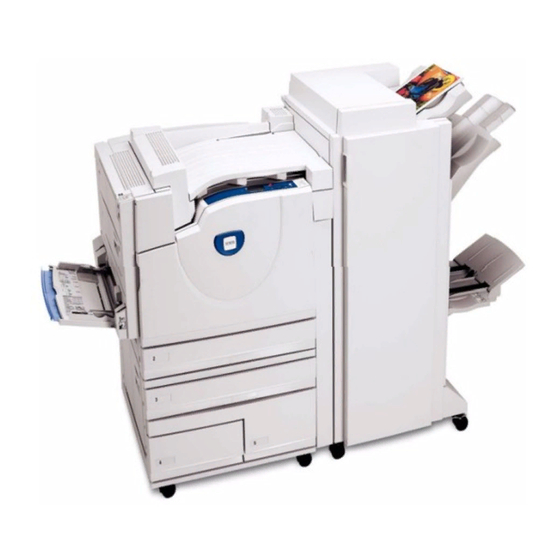Section 2: Evaluating Color Laser Printers
Evaluating Productivity
A color printer's overall productivity represents the sum of many of its specific
capabilities.
Print speed is an obvious specification to compare, but many other
factors play an important role in determining whether a printer can support a busy
workgroup, deliver the performance you expect and meet the demands of your users.
This criteria set will help you evaluate all aspects of a printer's productivity, and show
how the Phaser 7760 printer can help you increase the productivity of your employees.
Consider print speed
Since color printing, rather than black-and-white
printing, is the primary use for this class of color
printer, it makes sense to pay close attention to
the color print speed. For larger print jobs and
longer print runs, the rated engine speed of the
printer will play a large role in how quickly the
job is finished.
Calculate print job throughput
Print job throughput is the time it takes from
clicking the print button on your computer
screen to the final delivery of the document to
the output tray — sometimes called "click-to-
clunk." Rated print speed is only a part of the
time it takes to print a job – image-processing
speed can be even more important to maxi-
mizing throughput. Test against jobs typical
of your work environment — do you regularly
print large, image and color intensive images
that place an emphasis on RIP speed? Or, does
your business regularly print runs of 25, 50, or
hundreds of color documents or presentations?
Measure overall performance
To accurately measure overall printer perfor-
mance in a real workgroup environment, send a
mix of black-and-white and color documents of
different length and complexity to the printer
over a standard Ethernet network. This com-
bines the network transmission time, first-page-
out time, and multi-copy engine speed to paint
a clear picture of the actual overall performance
of the printer.
Consider multiple users
A color printer must be able to handle a wide
variety of documents quickly and reliably. A
color printer must keep up with the performance
demands of a shared network environment, and
be able to process jobs quickly and efficiently to
keep from becoming a productivity bottleneck.
Consider media flexibility
Think about the various document types your
business could generate in-house, and ensure
the printer you are considering can support the
type of paper or other media you would like to
use to produce that document. Things to keep
in mind as you evaluate this area are media
size, media weight, whether you'd prefer to use
custom-sized media, and how the printer is able
to communicate the media it has loaded to
users via the print driver.
How the Phaser 7760 exceeds the
productivity requirement:
The Phaser 7760 printer is the latest in a line of
highly-performing graphic-arts oriented printers
from Xerox. Graphic artists and general office
users will be pleased with its print speed and
ability to process jobs quickly and efficiently
and support a busy, networked environment.
Print Speed
The Phaser 7760 printer, at up to 35 ppm in
color and 45 ppm in black-and-white, is one of
the fastest color printers designed for use by
color professionals and graphics-intensive offices
— up to 46% faster than the HP
9500 printer in color and 88% faster in black-
and-white.
Print job throughput
With many years of experience, Xerox has
developed one of the most efficient RIPs (Raster
Image Processor) in the industry. Combine that
with an 800 MHz image processor and the
result is an impressive first-page-out time of as
few as 9 seconds for color. The resulting produc-
tivity means your prints can be finished while
competitors are still processing the image.
Xerox Phaser 7760 Evaluator Guide
LaserJet
®
®
9

